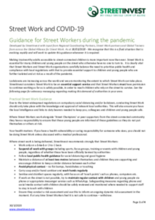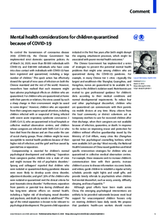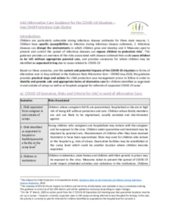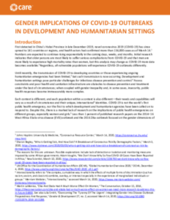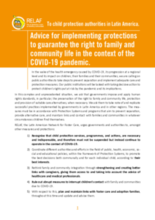This section includes resources related to separated children that may be useful during the COVID-19 pandemic.
Displaying 61 - 70 of 82
This guidance for street work during the Covid-19 crisis includes both practical guidance and advocacy messages and resources to support Street Work during this worrying time.
The COVID-19 Global HRP is a joint effort by members of the Inter-Agency Standing Committee (IASC), including UN, other international organizations and NGOs with a humanitarian mandate, to analyse and respond to the direct public health and indirect immediate humanitarian consequences of the pandemic, particularly on people in countries already facing other crises.
This comment from the Lancet reviews the implications of the COVID-19 crisis on children's mental health, including children who are separated from their caregivers.
This guide aims to help parents and families of children who are looked after in the care system during the Coronavirus outbreak.
This report from the VAWG Helpdesk explores the ways in which the COVID-19 pandemic may impact on violence against women and girls, based on emerging evidence, including increased risk of corporal punishment, sexual exploitation, and abuse of girls, as well as intensification of child protection issues due to children being separated from caregivers.
This guidance provides an overview of the risks associated with COVID-19 outbreak that could cause children to be left without appropriate parental care, and provides scenarios for where children may be identified as separated in Iraq due to issues related to COVID-19.
This appeal seeks to respond to additional needs which have emerged, or may do so in the short and medium term, in national contexts currently affected by humanitarian situations, as well as those that present more stable environments yet are equally vulnerable to the global pandemic, due to ill-prepared health systems and assistance mechanisms to respond at scale.
This analysis from CARE highlights the impacts of the COVID-19 crisis on women and girls, including the increased risk of violence and/or separation from caregivers for children, particularly girls.
This call to public authorities presents recommendations from RELAF for preventing family separation and implementing adequate care and protection measures to protect children’s rights put at risk by the pandemic and its implications.
This Practitioner Guidance Paper shares the different approaches taken by three Family for Every Child Members to mitigate this disruption: moving to online learning for unaccompanied minors with METAdrasi in Greece; using the radio to provide far-reaching lessons with FOST in Zimbabwe; and engaging parents in their children's education using a socially-distanced homework collection system with CAP Liberia.

